| Article ID | Journal | Published Year | Pages | File Type |
|---|---|---|---|---|
| 2485885 | Journal of Pharmaceutical Sciences | 2007 | 12 Pages |
Abstract
Although freeze dried formulations are commonly characterized using differential scanning calorimetry (DSC), a proteinârich system behaves as a “strong glass”, and the glass transition temperature, Tg, cannot be directly determined by DSC. A strong glass means a small heat capacity change at Tg, âµCp, and a very broad glass transition region, or a large âµTg. However, direct experimental evidence for a small âµCp and a large âµTg have been lacking. Here, we utilize extrapolation of thermal analysis data in protein:disaccharide mixtures to evaluate Tg, âµTg, and âµCp for “pure” human growth hormone (hGH) from low to moderate residual water. We find that âµTg is indeed large and âµCp is very small. Also, the Tg for pure hGH decreases from a value of about 136°C when dry to around 25°C at 12% water. This glass transition is not the onset of mobility within the protein molecule but rather signals onset of whole molecule rotation and translation. We also observe complex preâTg thermal events in the DSC data, which are interpreted as consequences of relaxation events, largely due to the disaccharide, and are characteristic of freeze dried systems having a broad distribution of relaxing substatesand the American Pharmacists Association J Pharm Sci 96: 2765-2776, 2007
Keywords
Related Topics
Health Sciences
Pharmacology, Toxicology and Pharmaceutical Science
Drug Discovery
Authors
Michael J. Pikal, D.R. Rigsbee, M.L. Roy,
